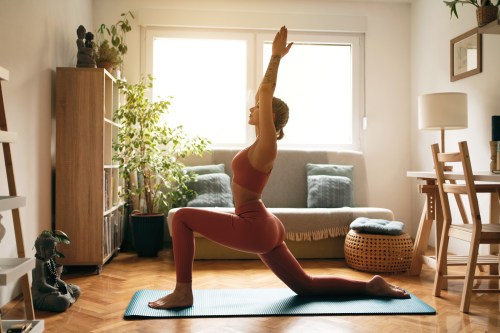We hate to break it to you, but that nighttime scrolling? Turns out it might not be lulling you to sleep like you think it is. A large new study out of Norway has found that reaching for your phone in bed does quite the opposite: it increases your risk for insomnia—a sleep disorder that causes difficulty falling asleep (and staying asleep) at least three nights a week for a minimum of three months.
Experts in This Article
board-certified doctor of sleep medicine and neurology, member of the board of directors of the American Academy of Sleep Medicine (AASM)
professor and senior researcher at the Norwegian Institute of Public Health
The study, published today in the journal Frontiers in Psychiatry, found that each additional hour of screen time before bed is linked with a 59 percent increased risk of insomnia and a 24-minute reduction in total sleep time.1 But social media isn't the only thing to blame here: All screen-related activities, including watching movies or videos, playing games, and even reading, were associated with negative effects on sleep.
To get these results, researchers collected data on the sleep and screen time habits of more than 45,000 Norwegian students between the ages of 18 and 28. Each student filled out a survey about what they do on their phones before bed, how long they look at their screens, their sleep and wake times, and whether they have trouble falling asleep. Researchers also scanned survey results for symptoms of insomnia, and results showed that the majority of students experienced sleep disturbances due to the use of screens before bed.
While this study draws a clear link between insomnia and screen use, it cannot confirm whether one necessarily causes the other. Instead, researchers highlight that using a phone (or tablet) before bed often takes away from the essential rest your body needs.
Curious to learn more? We spoke with one of the study authors, Børge Sivertsen, a professor and senior researcher at the Norwegian Institute of Public Health, to understand just why screens are detrimental to sleep—and how to sleep better overall.
Why screens are harmful to sleep
The light emitted from your phone (aka blue light) can cause your brain to stay awake and stimulated, which is the primary reason why health experts advise against screens at night.2 But using your phone doesn't only increase wakefulness—the Frontiers in Psychiatry researchers say it also limits your ability to get true rest.
"Spending time on screens in bed—regardless of the activity—may displace sleep and negatively impact sleep health," says Dr. Sivertsen. This may include relaxing activities, too, like listening to audio content. "While some students [in the study] used such content as a sleep aid, the data did not allow us to draw conclusions about the effects of specific screen activities," he adds.
In the short term, delaying sleep can make you tired during the day and reduce your ability to function. But over time, sleep deprivation can increase your risk for a variety of negative health outcomes such as heart disease, high blood pressure, diabetes, obesity, and mental health conditions like depression.
How to get a better night's sleep
The first thing to do for better sleep is to "Try to reduce screen use in bed, ideally stopping at least 30 to 60 minutes before sleep,” Gunnhild Johnsen Hjetland, the original study author and researcher at the Norwegian Institute of Public Health, said in the study. “If you do use screens, consider disabling notifications to minimize disruptions during the night.”
Once your phone's taken care of, these other strategies can help you get better zzzs. Here's what experts recommend:
- Turn down the lights: As you're getting ready for bed, switch over to dim or red lighting to help promote relaxation.
- Read a book or listen to music: Both activities help relax and slow down your mind, which is necessary for falling asleep.3 (Just try to avoid looking at your phone if you get music from there!)
- Keep your bedroom temp cool: Research shows that the ideal temperature for sleep is between 60 and 67 degrees Fahrenheit, Raman Malhotra, MD, a member of the board of directors of the American Academy of Sleep Medicine, previously told Well+Good.
- Try progressive muscle relaxation: This exercise, which involves clenching and releasing each muscle group in the body until they relax, is great if you feel restless in bed.
What to do if you think you have insomnia
We get it: Turning to your phone when you can't sleep at night is easy and sometimes feels like the only way to wind down or escape racing thoughts at night. But just know that there are better ways to relieve insomnia and get the quality rest you need. “If someone suspects they have insomnia, we recommend speaking with a healthcare professional to receive a proper assessment and support,” says Sivertsen.
“Cognitive behavioral therapy for insomnia (CBT-I) is the first-line recommended treatment and has strong evidence for its effectiveness. In the meantime, reducing time spent on screens in bed—especially during the hour before intended sleep—may be helpful for some individuals, regardless of the specific screen activity,” he adds.
- Hjetland, Gunnhild Johnsen, et al. “How and When Screens Are Used: Comparing Different Screen Activities and Sleep in Norwegian University Students.” Frontiers. doi:10.3389/fpsyt.2025.1548273
↩︎ - Heo, Jung-Yoon et al. “Effects of smartphone use with and without blue light at night in healthy adults: A randomized, double-blind, cross-over, placebo-controlled comparison.” Journal of psychiatric research vol. 87 (2017): 61-70. doi:10.1016/j.jpsychires.2016.12.010 ↩︎
- Finucane, Elaine et al. “Does reading a book in bed make a difference to sleep in comparison to not reading a book in bed? The People's Trial-an online, pragmatic, randomised trial.” Trials vol. 22,1 873. (2021). doi:10.1186/s13063-021-05831-3 ↩︎
Sign Up for Our Daily Newsletter
Get all the latest in wellness, trends, food, fitness, beauty, and more delivered right to your inbox.
Got it, you've been added to our email list.










